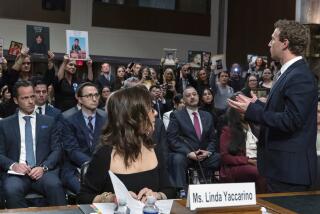CHILDREN’S TELEVISION LABELED A ‘DISASTER’
- Share via
Opening what is being billed as the first international conference on “Children and the Media” Monday at the Ambassador Hotel, Rep. James Bates (D-San Diego) called for intense “public pressure” to rectify “the disaster” of children’s television.
Just as public pressure altered the use of exit polls in national elections and curbed advertising of alcoholic beverages, educational television for children can also inspire grass-roots support, said Bates, a member of the House’s key subcommittee on telecommunications. “While children are not interested in the marketplace, parents are,” he pointed out.
A last-minute substitute for subcommittee chair Tim Wirth (D-Colo.), Bates said that as soon as he returns to Washington he will recommend to Wirth and Rep. Henry Waxman (D-Los Angeles, and chair of a health and environment subcommittee) that they hold hearings on the subject of children’s television.
At the same time, Bates sharply criticized the Federal Communications Commission for not following its own 1974 guidelines on children and TV.
“The FCC has justified its unwillingness to regulate children’s television by continually pointing to marketplace theory, promising that given a chance the marketplace will work better than any regulatory approach, but history shows that the marketplace consistently fails to work for children,” Bates charged. He added that, unfortunately, a U.S. Circuit Court of Appeals decision has recently backed up “this mythical marketplace phenomenon.”
About the only exception in the disaster of children’s programming, he said, was public television’s “Sesame Street.”
“Have you had occasion to watch children’s television lately?” he asked rhetorically. “It consists increasingly of program-length commercials designed to promote lines of toys, dolls and mechanical creations by subjecting children to half-hour sales pitches. The FCC refuses to even look at the deceptive nature of such practices.”
About 250 entertainers and broadcast executives, educators, psychiatrists and psychologists from as far away as the Sudan are attending the three-day conference. The gathering is co-sponsored by the Children’s Institute International of Los Angeles, which was founded in 1906, and the International Children’s Center, founded in 1949 in Paris by the French government and the United Nations Economic and Social Council.
Conference Chairman Stan J. Katz, a Los Angeles clinical psychologist who was adviser to the Emmy-winning TV movie “Something About Amelia,” said the purpose of the gathering was to improve the media for and about children. “We’re trying to create a dialogue between mental health and entertainment people for better television and feature films,” he explained.
Child-care expert Dr. Benjamin Spock, whose seminal work “Baby and Child Care” published in the ‘40s sold 32 million copies and was translated into 31 languages, spoke on “The Impact of the Multimedia Revolution on Children.”
Spock, 82, said he used to think that violence on radio and TV made no impression on youngsters. But he changed his mind, he said, after a teacher told him how her students who regularly watched “The Three Stooges” liked to “bop” each other.
Noting that the average child will have seen 18,000 murders on TV by the time he or she reaches maturity, Spock said, “I feel violently that children--and their parents--should not watch violence on television.”
Director Peter Bogdanovich, whose recent film “Mask” deals with a teen-ager living a normal life despite a congenitally disfigured face, co-led a panel on current adolescent perspectives on feature films.
Bates said public pressure is needed to improve the climate of children’s TV because Congress has already tried and failed to pass effective legislation along that line. He pointed out that during the last congressional session, Wirth tried to introduce a bill that would have required individual stations to provide one hour a day of educational television for children five days a week. That bill got nowhere, Bates said, because “broadcasters represent a very powerful special-interest lobby.”
During a question period, Phyllis Tucker Vinson, vice president of children’s programming for NBC, drew applause when she said her network is making every effort to improve television for children.
More to Read
Sign up for Essential California
The most important California stories and recommendations in your inbox every morning.
You may occasionally receive promotional content from the Los Angeles Times.













